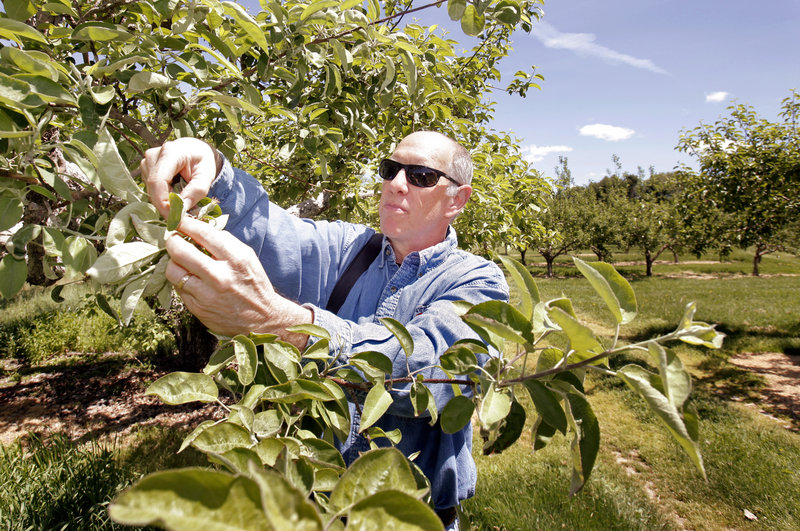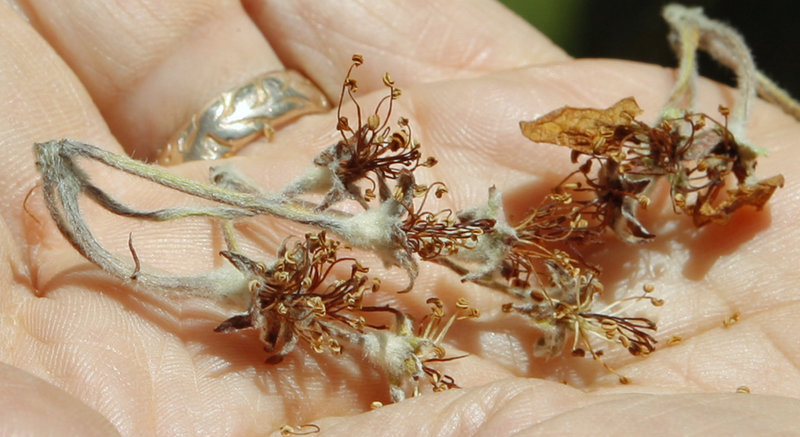CUMBERLAND — Some Maine apple orchards have lost virtually their entire crops two weeks after being hit by a killer frost.
Although many blossoms and early apples appeared to have survived the freeze that began the morning of May 10, they are now wilting and falling to the ground in huge numbers.
“I would say 90 percent of our crop is a loss, maybe 95,” said Greg Sweetser, whose family owns Sweetser’s Apple Barrel and Orchards in Cumberland. “Basically, we’re devastated. Wiped out.”
The damage was not universal. Many orchards had smaller losses, depending on their location and topography. And growers say there should be enough of a crop throughout the state to supply retail farm stands and many pick-your-own operations.
But the untimely freeze could reduce Maine’s $15-million-a-year apple crop by half, according to one expert.
It also may limit supplies of popular apple varieties, such as MacIntosh, Honeycrisp and Crispin, and will mean supermarkets won’t have as many Maine apples to sell next winter and spring, according to growers.
The frost could affect wholesale apple supplies throughout the entire Northeast.
“This was a regional thing,” said David Handley, vegetable and small fruit specialist with the University of Maine Cooperative Extension. “In New York and Pennsylvania, they all got it either the night before or two nights before we did.”
Nighttime temperatures dipped below 30 degrees during the pre-dawn hours on May 10, 11 and 12. Some orchards saw the temperature drop below 25 degrees the morning of the 11th.
While a frost in mid-May is not unheard of, it came during an otherwise warm spring when apple trees had blossomed a week or two earlier than usual. The freeze struck at the most vulnerable stage of the apple crop.
“Eighty percent of the trees had bloomed or set fruit when the frost hit,” said Sweetser, who grows 39 varieties of apples on about six acres. Sweetser said he’ll buy apples from other growers to supply his farm stand, but he won’t have the selection of rare varieties such as Wolfe River that his customers are used to.
Sweetser’s family has owned the orchard since the 1800s, and his 83-year-old father, Dick, had never before seen a frost cause such damage to a crop, he said. He said his small family business will be all right financially, but it won’t be hiring about 12 part-time pickers this summer and fall.
“It’s turning out to be worse than I thought,” said Renae Moran, a tree fruit specialist and horticulturist at the University of Maine. She has been visiting orchards around the state, including four or five that could lose virtually all of their apples.
“I think the apple crop is going to be no more than 50 percent of normal,” she said. “What’s really going to be impacted is the number of apples that end up in the supermarkets.”
Most of the hardest-hit orchards were in the southern half of the state, she said. Those located in low-lying areas or surrounded by forest were the most damaged, she said.
“It’s different here and there depending on their elevation, and the arrangement of the orchard,” Moran said.
Although overall supplies will be limited, Mainers and visitors will still be able to find fresh farm-stand apples, as well as orchards that can offer pick-your-own opportunities, experts said.
Ellen McAdam, whose family operates McDougal Orchards in Springvale, said she’s seen some damage in parts of the orchard, but not widespread losses.
Some blossoms and new apples are falling off the trees, and some of the apples that survived have frost rings, she said. But the orchard apparently escaped the extreme and prolonged freeze.
“There are plenty of apples” to keep customers happy, she said. “We won’t have any problem with that at all.”
Staff Writer John Richardson can be contacted at 791-6324 or at:
jrichardson@pressherald.com
Send questions/comments to the editors.



